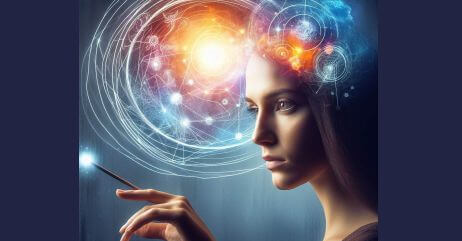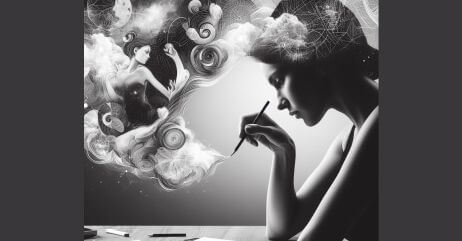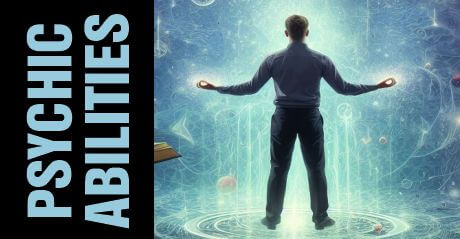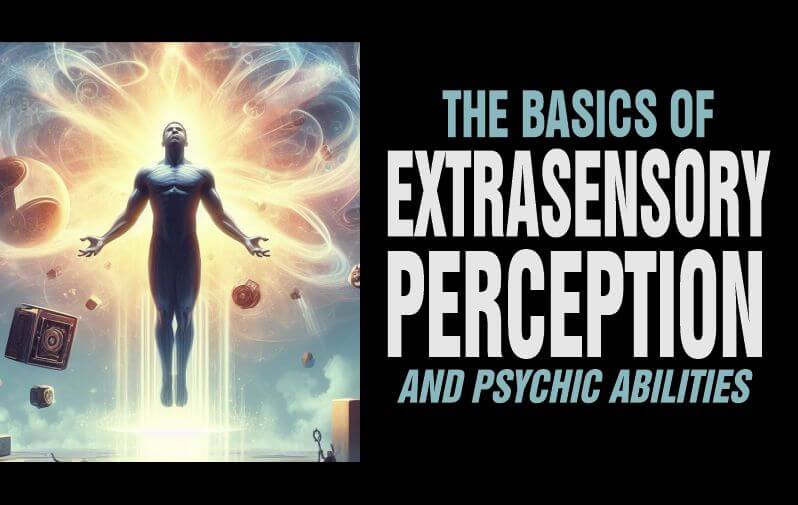Last updated on April 25th, 2025 at 02:56 am
Understand the basics of extrasensory perception (ESP) and psychic abilities, and the potential power of the human mind.
It always staggers my imagination, my ability to perceive to an extent the world beyond my five traditional senses, and I know I am not alone.
ESP has long captivated human imagination, representing the potential for us humans to perceive and understand the world beyond the five traditional senses.
This phenomenon of psychic ability covers claircognizance, telepathy, clairaudience, clairvoyance, precognition, and other intuitive abilities that defy conventional scientific explanations.
While skeptics challenge its validity, many individuals report experiences that suggest the existence of psychic abilities.
Exploring the mysteries of the human mind and its capacity to transcend physical limitations, the study of extrasensory perception continues to intrigue and inspire both scientists and the general public alike.
Recommended: Sensory play for toddlers.
Table of Contents
- Extrasensory Perception Meaning
- Growing Interest in Extrasensory Perception Superpower
- The Controversy Surrounding Extra Sensory Perception
- Signs of Psychic Ability
- Empath and Psychic Abilities
- Types of Extrasensory Perception
- Famous Cases and Examples of Extrasensory Perception
- How to Develop Psychic Abilities
- Practical Applications of Extrasensory Perception
- How Extrasensory Perception Can Be Helpful in Everyday Life
- Psychic Ability Test
- Books on Psychic Abilities
- Frequently Asked Questions
- Finally
Extrasensory Perception Meaning

Psychic Ability Extrasensory Perception Definition
Extra Sensory Perception (ESP) or psychic ability is the ability to acquire information beyond the five human traditional senses of sight, hearing, touch, taste, and smell.
As mentioned above, this phenomenon of covers various intuitive abilities such as telepathy, clairvoyance, precognition, and psychokinesis.
While ESP lacks empirical evidence in the scientific community, many people claim to have experienced instances of intuitive knowledge or communication that cannot be explained by conventional sensory perception.
The study of paranormal perception goes deep into the mysteries of human consciousness and the potential for the mind to transcend physical limitations, sparking both skepticism and fascination in equal measure.
Extrasensory Perception Psychology Definition
In psychology, the study of ESP falls within the realm of parapsychology, which explores phenomena that lie outside the scope of conventional scientific understanding.
It’s important to note that the existence of ESP is a topic of considerable debate within the scientific community, and many researchers remain skeptical about its validity.
Recommended: The Weird World
Growing Interest in Extrasensory Perception Superpower
The growing interest in paranormal perception superpower can be attributed to several factors.
Firstly, advancements in neuroscience and psychology have prompted a reevaluation of the human mind’s capabilities, leading to increased curiosity about the potential for intuitive abilities beyond conventional sensory perception.
Additionally, popular culture, including movies, books, and television shows, has perpetuated the allure of extrasensory perception, fueling public fascination and prompting individuals to explore the limits of human consciousness.
Moreover, the rise of alternative healing practices and spiritual movements has contributed to a heightened interest in intuitive abilities and the exploration of non-traditional forms of knowledge acquisition.
The growing interest in ESP reflects a broader societal shift towards embracing the mysteries of the human mind and its potential for transcending established scientific boundaries.
Related: How to Improve Your Intuition
The Controversy Surrounding Extra Sensory Perception

The controversy surrounding ESP arises due to the lack of scientific consensus on its existence and skepticism from critics who argue that the phenomenon is parapsychological, rather than a genuine cognitive ability.
One aspect of the controversy stems from the perceived lack of replicable scientific evidence supporting the phenomenon.
Many experiments claiming to prove the existence of ESP have been criticized for flawed methodologies, biased research, or insufficient statistical analysis.
For example, some studies presented as evidence for ESP failed to take into account the possibility of chance results or experimenter biases, thereby raising doubts about the reliability of their findings.
Despite these criticisms, there have been some scientific studies conducted on ESP that have garnered attention and sparked debates.
Related: Body Intelligence and Physical Intuition

One well-known study is the ganzfeld experiment, where participants underwent sensory deprivation and were then asked to receive information from distant sources.
Although some meta-analyses of ganzfeld studies have reported statistically significant results, critics argue that inconsistencies in the experimental procedures and the overall methodological limitations weaken the reliability of these findings.
Another notable study is the Rhine Card Experiment, conducted by the parapsychologist J.B. Rhine in the 1930s.
In this experiment, participants were asked to guess the identity of hidden cards, and their results were analyzed statistically.
While the initial experiments seemed to show evidence for ESP, subsequent studies failed to replicate these findings.
To cap it, the scientific studies on ESP remain inconclusive and controversial. Skeptics argue that the lack of consistent, reliable evidence challenges the existence of ESP, considering it as a product of chance, cognitive biases, or flaws in the experimental design.
However, proponents of ESP continue to argue that the inconclusive results could be due to the inherently elusive nature of the phenomenon or the limitations of current scientific methods in capturing and understanding it.
As a result, the controversy around ESP remains a topic of ongoing debate within the scientific community.
Signs of Psychic Ability
While every human has some extrasensory perception, some people are aware of theirs and deliberately hone them for their different needs.
Also, others might not care or don’t know how to understand their sixth sense abilities.
Here are some signs you are active in the extrasensory and psychic department:
Intuition: People with psychic abilities often have a strong sense of intuition. They may have a deep knowledge of people or situations without any logical explanation.
Vivid Dreams: If you are psychic, you often experience vivid and prophetic dreams. They may dream about future events or receive important information through their dreams.
Deja Vu: Feeling a strong sense of familiarity or having the sensation that a current situation has been experienced before could be a sign of psychic ability.
Sensing Energy: Psychics can often feel or sense the energy of people, places, or objects. They may be able to pick up on the emotions or intentions of others.
Telepathy: Some psychics can communicate with others telepathically. They may pick up on thoughts or receive messages from others in their mind.
Mediumship: Psychic ability can also manifest through the ability to communicate with spirits or deceased loved ones. Mediums can receive messages or information from the world beyond.
Premonitions: Feeling or sensing future events before they happen is a common sign of psychic ability. This can come in the form of vivid visions, strong gut feelings, or a sense of impending danger.
Empathy: Empaths can sense and feel the emotions and energy of others. They often have an innate understanding of what someone else is going through.
Animal Communication: Some psychics can communicate with animals and understand their needs or emotions. They may be able to establish a deeper connection with animals than others can.
Synchronicities: Psychics often experience a series of meaningful coincidences or synchronicities in their lives. These synchronicities can serve as guidance or validation of their psychic abilities.
Empath and Psychic Abilities

Empath
Empath and psychic abilities both pertain to the ability to perceive and understand information beyond normal human sensory perception. However, they differ in certain aspects.
Empathy is the capacity to feel and understand the emotions, experiences, and energies of other people, animals, or even places.
Empaths are highly sensitive to the emotions and energies around them and can often pick up on the feelings of others without direct communication.
They can sense and absorb the emotions, both positive and negative, of people in their vicinity.
This ability allows them to have a deep understanding and connection with others, often making them compassionate and good listeners.
However, it’s important to note that empathy is not limited to emotion, as some empaths can also have an intuitive understanding of physical sensations or illnesses.
Psychics
On the other hand, psychic abilities are the capacity to perceive information through channels beyond the commonly recognized senses like sight, hearing, taste, touch, and smell.
Psychic abilities come in various forms and can include extrasensory perception (ESP), clairvoyance (the ability to see things beyond normal sight), clairaudience (the ability to hear information beyond normal hearing), clairsentience (the ability to sense or perceive information), precognition (the ability to foresee future events), telepathy (the ability to communicate mind-to-mind), and psychokinesis (the ability to manipulate objects with the mind).
Psychics may use different methods to access and interpret this information, such as tarot cards, crystal balls, meditation, or simply relying on their innate abilities. Psychic abilities can be developed and honed through practice and study.
Certainly, both empathic and psychic abilities offer you a unique and heightened perception of the world, allowing you to gather information that goes beyond normal human senses and understanding.
Types of Extrasensory Perception
There are four ways paranormal perception manifests. Let’s take a look…
Clairvoyance: Clairvoyance is the ability to perceive information about events, people, or objects that are not within the range of normal senses. This type of sixth sense is often associated with the ability to see things that are happening in different locations or to perceive information about the past or future.
Telepathy: Telepathy is the ability to transmit or receive thoughts, feelings, or information from one person to another without the use of normal physical communication methods such as speech or writing. It is the ability to directly perceive someone else’s thoughts or to communicate with them mentally.
Precognition: Precognition is the ability to perceive or predict future events before they happen. This form of ESP allows you to have knowledge or awareness of future events or experiences that cannot be explained by normal processes of deduction or inference.
Psychokinesis: Psychokinesis, also known as telekinesis, is the ability to manipulate or move objects or influence the physical environment with the power of the mind. This includes activities such as bending spoons, levitating objects, or moving things without physical contact. Psychokinesis involves the direct influence of the physical world using mental abilities.
Famous Cases and Examples of Extrasensory Perception
Here are documented extrasensory perception cases:
Uri Geller: Uri Geller is a famous Israeli mentalist who claims to possess the sixth sense such as psychokinesis and telepathy. He gained widespread fame in the 1970s for his spoon-bending tricks and has continued to be a prominent figure in the field of paranormal activities.
Ingo Swann: Ingo Swann was an American psychic, artist, and author who claimed to have inherent paranormal abilities, particularly in remote viewing. He was one of the participants in the controversial CIA-funded remote viewing program known as Stargate Project.
Edgar Cayce: Known as the “Sleeping Prophet,” Edgar Cayce was an American psychic who claimed to possess extraordinary psychic abilities. He provided psychic readings while in a self-induced trance state and was highly regarded for his accurate medical diagnoses.
Specific Cases of ESP Phenomena
The Stanford Research Institute (SRI) Remote Viewing Program: In the 1970s and 1980s, the SRI conducted a prominent remote viewing program funded by the US government. Although the results of the program remain controversial, some of the cases showed significant accuracy in remote viewing missions, which triggered the interest of the public.
The Enfield Poltergeist: The Enfield Poltergeist haunting, which started in 1977 in Enfield, London, garnered international attention for alleged occurrences of telekinesis and other paranormal phenomena. This case involved two sisters and featured numerous instances of objects moving, voices from unseen entities, and other inexplicable events. It remains one of the most documented poltergeist cases.
Jeanne Dixon’s Predictions: Jeanne Dixon was an American psychic who became famous for her predictions, particularly her prophecy about the assassination of President John F. Kennedy in 1963. Throughout her career, she claimed to have predicted numerous other significant events, such as natural disasters and political outcomes. Her predictions gained attention and left a lasting impact on the public.
How to Develop Psychic Abilities

Developing and enhancing the sixth sense is the process of honing and expanding your natural paranormal abilities that go beyond the five traditional senses.
It involves tapping into your intuition and gaining insights or information about people, situations, or events through methods other than the usual sensory perception.
Practical Techniques Used to Enhance Extrasensory Perception
Visualization: Visualization techniques involve creating vivid mental images to strengthen the mind’s ability to receive and interpret non-physical information. Practitioners often visualize specific outcomes, remote locations, or even simple shapes and colors to develop their extrasensory abilities.
Meditation: Regular meditation practice helps quiet the mind and heighten awareness, allowing you to better tune into your intuitive abilities. By focusing on the breath or a specific object during meditation, the mind becomes more receptive to picking up subtle energetic information.
Intuition Exercises: These exercises involve practicing and trusting your intuition in day-to-day life. It can include making simple decisions based solely on gut feelings, predicting outcomes of events, or sensing the emotions and thoughts of others.
Dream Journaling: Keeping a dream journal helps you recall and analyze your dreams, which often contain symbolic or psychic information. Over time, this practice can improve the ability to receive information from one’s subconscious mind or tap into collective consciousness.
Meditation and Mindfulness Practices for Improving Perception
Mindfulness Meditation: This involves bringing full attention and awareness to the present moment, including your thoughts, feelings, bodily sensations, and the surrounding environment. By practicing mindfulness, you can enhance your overall perception and become more attuned to intuitive insights.
Body Scan Meditation: This meditation technique focuses on systematically bringing attention to each part of the body, starting from the head and moving downwards. This practice cultivates a deep awareness of bodily sensations, which can help you become more attuned to subtle energetic cues.
Open Monitoring Meditation: Open monitoring meditation involves observing and being aware of the experiences as they arise, without judgment or attachment. By practicing this form of meditation, you can develop a heightened level of awareness and become more perceptive of subtle energies or psychic information.
Practical Applications of Extrasensory Perception
Practical applications of intuition, also known as the sixth sense or psychic abilities, have been a topic of interest and controversy for many years.
While the existence of ESP is still debated among scientists, there are a few possible ways it could be applied in various fields, as well as some potential benefits it could provide in everyday life.
Practical Uses of Extrasensory Perception in Various Fields
Healthcare: ESP could potentially aid medical professionals in diagnosing illnesses or conditions that are difficult to detect through traditional methods. For instance, a psychic could sense subtle changes in a patient’s energy field that might indicate an underlying issue before any physical symptoms arise.
Law Enforcement: ESP could be used as a tool for solving crimes or locating missing persons. Psychics who claim to have psychic detective skills have occasionally assisted investigators in finding key evidence or even providing information that leads to the resolution of a case.
Business Decision-making: Intuition plays a significant role in decision-making, and ESP could enhance or amplify those intuitive abilities. Business leaders could use psychic insights to navigate uncertain situations, forecast market trends, or anticipate potential risks, giving them a competitive edge.
Personal Development and Therapy: Extrasensory perception could be utilized in alternative therapies or personal development practices. Psychics or intuitive counselors may help individuals gain deeper self-awareness, unlock repressed memories, or identify unresolved issues that could lead to personal growth or healing.
How Extrasensory Perception Can Be Helpful in Everyday Life
Decision-making: ESP could assist you in making critical decisions by providing insights or intuitive guidance that may not be immediately apparent. Whether it’s choosing between job opportunities, making personal choices, or even finding lost items, intuition could offer additional information for decision-making.
Relationships: Psychic abilities could potentially help you understand and navigate your relationships better. By tuning into your intuition, you might gain insights into the thoughts, emotions, or intentions of others, resulting in improved communication, empathy, and deeper connection.
Self-improvement: Possessing intuitive abilities could be used as a tool for personal growth and development. By tapping into your own paranormal abilities, you may gain a better understanding of yourself, explore your own intuition, and become more attuned to your own needs and desires.
Healing and Wellness: Intuitive abilities could be useful in alternative healing practices. Some claim that energy healers or spiritual practitioners with the sixth sense can identify and address energetic imbalances or blockages in the body, promoting physical and emotional well-being.
Psychic Ability Test
Psychic abilities tests are designed to assess your psychic or extrasensory perception skills.
These tests typically involve a series of experiments or tasks that aim to evaluate your ability to gather information away from the five known senses.
Here are a few common types of paranormal abilities tests:
1. Telepathy Test
The telepathy test evaluates the ability to perceive or transmit thoughts or mental images from one person to another, without any physical communication or cues.
For example, the test may involve two participants, one acting as a sender and the other as a receiver, attempting to mentally transmit or receive specific symbols, numbers, or images.
2. Precognition Test
This type of test assesses your ability to predict future events or outcomes.
The test may involve presenting you with a series of future events or images and asking you to identify or describe what they believe will happen next.
These tests aim to evaluate if you can access information about events that have not yet occurred.
3. Remote Viewing Test
The remote viewing test measures an individual’s ability to access information about a person, object, or location that is hidden from their senses.
The person being tested may be asked to describe or draw attributes of a distant or concealed item, place, or individual, without having any prior knowledge or sensory input about it.
4. Psychokinesis Test
The psychokinesis test evaluates an individual’s supposed ability to influence or manipulate objects or events using only the power of their mind.
For example, the person may be asked to move or affect an object without any apparent physical force or contact.
Psychic Abilities Quiz
Here are a few psychic abilities quizzes you can find on the internet:
Psychic Ability Test by Psychic Science: This quiz consists of a series of multiple-choice questions designed to assess your potential intuitive abilities, including clairvoyance, telepathy, precognition, and more. You can find this quiz at: https://psychicscience.org/esp-quiz
Psychic Ability Quiz by ProProfs: This quiz aims to help you discover your natural psychic abilities by answering a series of questions related to intuition, empathy, precognition, and psychic sensitivity. You can find this quiz at: https://www.proprofs.com/quiz-school/story.php?title=what-is-your-true-psychic-ability
Psychic Personality Quiz by Psychic Source: This quiz aims to help you determine your psychic personality type by assessing your unique traits and inclinations. It includes questions about dreams, intuition, sensitivities, and psychic experiences. You can find this quiz at: https://www.psychicsource.com/psychic-quiz
Remember that these quizzes are for entertainment purposes only and may not accurately determine your psychic abilities.
Books on Psychic Abilities
Here are some books that delve into psychic and extrasensory abilities.
“The Empath’s Survival Guide: Life Strategies for Sensitive People” by Judith Orloff
“Psychic Development for Beginners: An Easy Guide to Developing & Releasing Your Psychic Abilities” by William W. Hewitt
“Psychic: The Ultimate Psychic Development Guide to Developing Abilities Such as Clairvoyance, Intuition, Telepathy, Healing, Aura Reading, Mediumship, and Connecting to Your Spirit Guides” by Kimberly Moon
“You Are Psychic: The Art of Clairvoyant Reading & Healing” by Debra Lynne Katz
“Opening to Channel: How to Connect with Your Guide” by Sanaya Roman and Duane Packer
“Psychic Abilities: Awakening Your Telepathic, Psychokinetic, and Healing Powers” by David F. Vennells
“The Psychic Pathway: A Workbook for Reawakening the Voice of Your Soul” by Sonia Choquette
“Psychic Development: A Psychic’s Handbook” by Amethyst Mahoney
“Practical Intuition: How to Harness the Power of Your Instinct and Make It Work for You” by Laura Day
“Psychic: The Psychic Development Guide for Strengthening Your Psychic Abilities” by Tabitha Zalot.
More books on intuition and extrasensory abilities.
Frequently Asked Questions
Who came up with the phrase extrasensory perception?
The phrase “extrasensory perception” was coined by researcher J.B. Rhine in the 1930s during his studies on paranormal phenomena.
What is an example of extrasensory perception?
An example of extrasensory perception is the ability to accurately perceive information without using the known physical senses.
What are the 4 types of perception?
The four types of perception are visual, auditory, olfactory (smell), and tactile (touch) perception.
What sense is sometimes called the extrasensory perception?
The sense sometimes referred to as psychic ability is often associated with the mind or intuition.
Are psychic abilities real?
The reality of psychic abilities is a topic of ongoing debate and skepticism within the scientific community.
How do I know if I have psychic abilities?
Determining if one has psychic abilities involves self-reflection, introspection, and potentially seeking guidance from experts in the field.
What are my psychic abilities?
Psychic abilities may include telepathy, clairvoyance, precognition, psychokinesis, empathy, and mediumship, among others.
Finally
The study of extrasensory perception and psychic abilities has provided us with intriguing insights into the human mind and its potential.
Although these phenomena are not fully understood, they continue to captivate our imagination and push the boundaries of scientific inquiry.
The existence of psychic abilities challenges traditional notions of perception and opens up new possibilities for understanding the interconnectedness of our world.
As further research and investigation continue, we may unlock even more mysteries surrounding these extraordinary human capabilities.
References:
- https://www.cliffsnotes.com/study-guides/psychology/psychology/psychology-perception/extrasensory-perception
- https://undsci.berkeley.edu/esp-what-can-science-say/
- https://www.livescience.com/ESP
Pyo Merez (PsyD) is a distinguished adolescent and adult psychologist at the forefront of mental health advocacy.
With expertise in cognitive and developmental psychology, focusing on social relationships, cultural contexts, and individual differences, Pyo has dedicated his career to empowering adolescents and adults.
As a sought-after speaker and panelist, Pyo shares invaluable insights on issues affecting young people, contributing to a deeper understanding of mental health and well-being in today's society.


